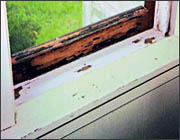 Our
lead paint inspection typically involves
a "surface by surface" investigation
of painted components for the presence
or absence of lead. We have 16 years
experience in the lead inspection
and testing industry. Our services
in lead paint and lead in dust testing
have focused primarily on public housing,
target housing and child-occupied
facilities in addition to commercial,
single-family housing and manufacturing
facilities. We are very familiar with
the Housing and Urban Our
lead paint inspection typically involves
a "surface by surface" investigation
of painted components for the presence
or absence of lead. We have 16 years
experience in the lead inspection
and testing industry. Our services
in lead paint and lead in dust testing
have focused primarily on public housing,
target housing and child-occupied
facilities in addition to commercial,
single-family housing and manufacturing
facilities. We are very familiar with
the Housing and Urban Development (HUD) protocol, performance
and limitations of all lead testing
and sample collection techniques,
interpretation of test results and
the implementation of quality control
procedures. Since the scope of the
lead problem is so great and the cost
of abatement is so high, the preferred
method for the detection of lead in
paint is the x-ray fluorescence analyzer
(XRF). The XRF gives accurate instantaneous
results of the amount of lead in paint
and dust. Our Lead inspection services
also include personnel monitoring
during lead work, and clearance sampling
upon completion of a lead abatement
work site.
Development (HUD) protocol, performance
and limitations of all lead testing
and sample collection techniques,
interpretation of test results and
the implementation of quality control
procedures. Since the scope of the
lead problem is so great and the cost
of abatement is so high, the preferred
method for the detection of lead in
paint is the x-ray fluorescence analyzer
(XRF). The XRF gives accurate instantaneous
results of the amount of lead in paint
and dust. Our Lead inspection services
also include personnel monitoring
during lead work, and clearance sampling
upon completion of a lead abatement
work site.
Lead
Exposure Risk Assessment
Research
suggests that the primary sources
of lead exposure for most children
are:
- Deteriorating lead-based paint
- Lead contaminated dust
- Lead contaminated residential
soil

The
objective of our risk assessment is
to identify all lead hazards in the
home or community, pathways through
which exposure to lead occurs such
as dust and soil, likely sources of
exposure and identify the options
for management or removal of any hazards
or source of lead in paint, dust or
drinking water. Water quality testing,
structural condition, maintenance/painting
history and community environment
all play a part in determining what
hazards may be present or the potential
for lead hazards.
 Some
dishes and clay cookware contain high
levels of lead in the glaze or decoration.
Terra cotta bean pots and dishes from
Mexico are especially hazardous and
should be used only for decoration. Some
dishes and clay cookware contain high
levels of lead in the glaze or decoration.
Terra cotta bean pots and dishes from
Mexico are especially hazardous and
should be used only for decoration.
|


